 It all seemed almost like my own, that was true. But as early romance gave way to marriage, I realized that it is one thing to be from somewhere, to know it by heart, and another to adopt a place or have it chosen for you. My marriage chose Atlanta for me, and I was then adopted by my husband’s many circles of friends. Yet until our last year or so there, though, I had an indistinct feeling of being on the outside looking in — someone who belonged more by association than creed.
It all seemed almost like my own, that was true. But as early romance gave way to marriage, I realized that it is one thing to be from somewhere, to know it by heart, and another to adopt a place or have it chosen for you. My marriage chose Atlanta for me, and I was then adopted by my husband’s many circles of friends. Yet until our last year or so there, though, I had an indistinct feeling of being on the outside looking in — someone who belonged more by association than creed.
 Before, I’d wanted to be a fireman
Before, I’d wanted to be a fireman
and then an electrician
who climbed poles in snowstorms
and, for a spell, an architect.
But I knew the next morning
that it would be something else.
 By sheer will, I managed to remain horizontal, feet obediently planted firmly on the wall of rock. While gaining a small victory over the battle waging within, I remembered the young girl who was dangling on a rope beside me. Surely, she must be terrified. To be helpless, at the mercy of another, and to be unable to see seemed unimaginable. She was completely vulnerable.
By sheer will, I managed to remain horizontal, feet obediently planted firmly on the wall of rock. While gaining a small victory over the battle waging within, I remembered the young girl who was dangling on a rope beside me. Surely, she must be terrified. To be helpless, at the mercy of another, and to be unable to see seemed unimaginable. She was completely vulnerable.
Yet she was smiling. And laughing.
 I glanced behind me and ached for the desert — a landscape in which things and maybe people, too, thrust deeper roots into the rocky earth in order to survive. It is a land teeming with earth-toned life, as though wildness found just enough water to scratch color onto the earth’s skin only to have the sun bleach it out again. Struggle is its tradition, baked under the scorching sun in a massive sky, seasoned with diverse cultures in providential collision. The history of the land unfurls into the present like the deep fuchsia blossoms of a White Sands cactus. I didn’t like this arid landscape much until after I left.
I glanced behind me and ached for the desert — a landscape in which things and maybe people, too, thrust deeper roots into the rocky earth in order to survive. It is a land teeming with earth-toned life, as though wildness found just enough water to scratch color onto the earth’s skin only to have the sun bleach it out again. Struggle is its tradition, baked under the scorching sun in a massive sky, seasoned with diverse cultures in providential collision. The history of the land unfurls into the present like the deep fuchsia blossoms of a White Sands cactus. I didn’t like this arid landscape much until after I left.
 Pulling a notepad out of your pocket
Pulling a notepad out of your pocket
bent with sitting, grimy and dog-eared
your pencil at the ready, you tumbled
like a bear out of the cab, writing as you ran
Toward the lamb just being born
toward the godly miracle of it, toward the sun
 When we tell our struggle and pain and joy and even what makes us laugh, we know more deeply who we are. And we know more deeply who each other is. We all need listeners, intellectual stretchers, confidants, energetic people, angels, spiritual guides, and helpers in our lives. Because we need belonging. It is difficult to create an environment of belonging for a child if you don’t feel like you belong anywhere. So find someone who listens, and tell your story. Let yourself be known. Once you have a powerful sense of belonging, you can’t help but begin to create that wherever you are.
When we tell our struggle and pain and joy and even what makes us laugh, we know more deeply who we are. And we know more deeply who each other is. We all need listeners, intellectual stretchers, confidants, energetic people, angels, spiritual guides, and helpers in our lives. Because we need belonging. It is difficult to create an environment of belonging for a child if you don’t feel like you belong anywhere. So find someone who listens, and tell your story. Let yourself be known. Once you have a powerful sense of belonging, you can’t help but begin to create that wherever you are.
 Once a week they arrive at our church. We sit them down at a table with us, one by one, our guests, longing to be Jesus to them, to assist in the miracles of change by the power of His Spirit. Their poverty is immediate and unmediated. We are eye to eye, hand to hand with them. There is no mistaking the grime on the skin, the stink of the unwashed, the flush of fever, the glazed eyes of the whacked out. This is no abstraction, no theoretical sociological condition. They are marked indelibly by their deprivation. They want a life for themselves and for their children, but where can it be? The sense of the impossible overwhelms them.
Once a week they arrive at our church. We sit them down at a table with us, one by one, our guests, longing to be Jesus to them, to assist in the miracles of change by the power of His Spirit. Their poverty is immediate and unmediated. We are eye to eye, hand to hand with them. There is no mistaking the grime on the skin, the stink of the unwashed, the flush of fever, the glazed eyes of the whacked out. This is no abstraction, no theoretical sociological condition. They are marked indelibly by their deprivation. They want a life for themselves and for their children, but where can it be? The sense of the impossible overwhelms them.
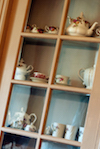 I value the domestic arts. I believe in the importance of beauty, whether that beauty is in the form of a poem or a child’s first birthday cake. Yet, I have recently arrived at a place where the things I have learned, the skills I have practiced, and the supplies I have hoarded in kitchen cabinets and over-stuffed drawers are no longer helping me to create this precious thing called hospitality.
I value the domestic arts. I believe in the importance of beauty, whether that beauty is in the form of a poem or a child’s first birthday cake. Yet, I have recently arrived at a place where the things I have learned, the skills I have practiced, and the supplies I have hoarded in kitchen cabinets and over-stuffed drawers are no longer helping me to create this precious thing called hospitality.
 It is slightly possible that the world needs calculating over-thinkers like me to help them see just as much as we grim curmudgeons need light-hearted souls to help us see and remember to breathe. As with dancing, some things are better left to more carefree, exuberant night owls. For my part, I hope to learn to gently move through the achy breaky friction of stress and near-falling apart in order to participate in my own idiosyncratic dance of sorts: one of genuine levity and introspection, delighting in motion and the way living and dying dance and wait on one another.
It is slightly possible that the world needs calculating over-thinkers like me to help them see just as much as we grim curmudgeons need light-hearted souls to help us see and remember to breathe. As with dancing, some things are better left to more carefree, exuberant night owls. For my part, I hope to learn to gently move through the achy breaky friction of stress and near-falling apart in order to participate in my own idiosyncratic dance of sorts: one of genuine levity and introspection, delighting in motion and the way living and dying dance and wait on one another.
The Troughs
Troughs are crucial seasons in the life of faith, revealing the rotting, lesser crutches on which we depend, conditioning our spiritual muscles, and nurturing our hope in heaven. Sorrow and suffering produce immense spiritual momentum. Grasping their hands as traveling companions, like Much Afraid in Hannah Hurnard’s time-honored allegory Hinds’ Feet on High Places, strengthens our stride over time. Rejecting them produces bitterness and strain, because the troughs will find us, whether or not we look for them.
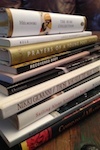 Poetry will never buy me bread or pay my rent. It will never pick up my children from school when I’m sick. It will not offer me a ride to the airport. Poetry will slip from my memory when I am old, phrases long memorized will most likely be buried under medical bills and compression hose and even so it will not forsake me completely. It will live deep in my cells, deep in my breath, deep in my history, and my making. It will buoy me when the water rises, when the dark falls, holding me with unseen hands, the memory of years past; words placed like pillars long forgotten.
Poetry will never buy me bread or pay my rent. It will never pick up my children from school when I’m sick. It will not offer me a ride to the airport. Poetry will slip from my memory when I am old, phrases long memorized will most likely be buried under medical bills and compression hose and even so it will not forsake me completely. It will live deep in my cells, deep in my breath, deep in my history, and my making. It will buoy me when the water rises, when the dark falls, holding me with unseen hands, the memory of years past; words placed like pillars long forgotten.
 On this trip to Kentucky, I’m staying in a small cottage overlooking the pond at the back of Bethany Springs (the Thomas Merton Retreat Center), rather than at the monastery itself. Partly because of something I felt with renewed force when I finished reading Merton’s memoir last year. I am interested in neither a monastic life, nor an ascetic one. I’ll gladly stand with Jovinianus (and against St. Jerome, who identified this as an honest-to-God heresy, back in the year 393) in the declaration that abstinence from food is no better, in the eyes of God, than a thankful receiving of such. And you’ll find me much quicker these days to quote Mary Oliver’s “Wild Geese” than to agree with St Paul’s Greek-influenced dichotomy between spirit and flesh.
On this trip to Kentucky, I’m staying in a small cottage overlooking the pond at the back of Bethany Springs (the Thomas Merton Retreat Center), rather than at the monastery itself. Partly because of something I felt with renewed force when I finished reading Merton’s memoir last year. I am interested in neither a monastic life, nor an ascetic one. I’ll gladly stand with Jovinianus (and against St. Jerome, who identified this as an honest-to-God heresy, back in the year 393) in the declaration that abstinence from food is no better, in the eyes of God, than a thankful receiving of such. And you’ll find me much quicker these days to quote Mary Oliver’s “Wild Geese” than to agree with St Paul’s Greek-influenced dichotomy between spirit and flesh.
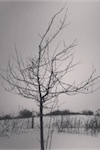 When I wash the dishes or grade the multiple choice quizzes, then, I try to cultivate my understanding of how those tasks fit into(yes!) the redemptive arc of history. Maybe I'm joining in God’s creative nature by creating babies and veggie stir-fry and quilts, by telling stories and painting with watercolors and making up silly songs and dances. Maybe I am making all things new by doing loads of laundry and getting dirty dishes to sparkle again. In each of these tasks, I am — hopefully — participating in God's plan to bring restoration to a broken world.
When I wash the dishes or grade the multiple choice quizzes, then, I try to cultivate my understanding of how those tasks fit into(yes!) the redemptive arc of history. Maybe I'm joining in God’s creative nature by creating babies and veggie stir-fry and quilts, by telling stories and painting with watercolors and making up silly songs and dances. Maybe I am making all things new by doing loads of laundry and getting dirty dishes to sparkle again. In each of these tasks, I am — hopefully — participating in God's plan to bring restoration to a broken world.
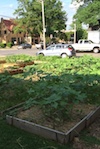 It’s hard to tell whether this clay was accidentally or intentionally smashed. The pieces have been fitted back together, and the fault lines are visible, but the glue is not. Iridescent stone beads adorn some of the cracks, where a little bit of pot is missing. Some shards were individually painted before they rejoined their places. It looks like people worked together to restore it. It’s no good for holding water now, but it can’t hold dark any more either. Where the water would pour out, light pours in.
It’s hard to tell whether this clay was accidentally or intentionally smashed. The pieces have been fitted back together, and the fault lines are visible, but the glue is not. Iridescent stone beads adorn some of the cracks, where a little bit of pot is missing. Some shards were individually painted before they rejoined their places. It looks like people worked together to restore it. It’s no good for holding water now, but it can’t hold dark any more either. Where the water would pour out, light pours in.
 This creation of lilies, sparrows, guinea pigs, dogs, surgery patients, and elderly people groans. Every bit of our world suffers the Fall in a truly personal way. So it’s okay to sob on this planet where the innocent suffer right alongside the rest of us — even for hardened surgeons or my brother the Marine, for my grandparents who have lost almost all of their friends, or for anyone who’s waited too long by a hospital bed.
This creation of lilies, sparrows, guinea pigs, dogs, surgery patients, and elderly people groans. Every bit of our world suffers the Fall in a truly personal way. So it’s okay to sob on this planet where the innocent suffer right alongside the rest of us — even for hardened surgeons or my brother the Marine, for my grandparents who have lost almost all of their friends, or for anyone who’s waited too long by a hospital bed.
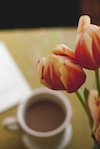 Writing a letter to a stranger is all about trust. To offer your thoughts and opinions, some of which you might never say out loud, is truly relationship building. But there’s also something refreshing about writing to someone who is not fully aware of your daily life, your flaws, the way you look, or how cute your children are. They get a totally different picture of things, which makes the whole thing special. Our relationship took awhile to gain traction, and it was about a year before Michelle and I got to the meat and potatoes of things. Now I feel comfortable writing to her about just about anything, including some things I might never say out loud to people in my daily life.
Writing a letter to a stranger is all about trust. To offer your thoughts and opinions, some of which you might never say out loud, is truly relationship building. But there’s also something refreshing about writing to someone who is not fully aware of your daily life, your flaws, the way you look, or how cute your children are. They get a totally different picture of things, which makes the whole thing special. Our relationship took awhile to gain traction, and it was about a year before Michelle and I got to the meat and potatoes of things. Now I feel comfortable writing to her about just about anything, including some things I might never say out loud to people in my daily life.
 Why we think of up as good and down as bad, I’m not sure. That directionality seems arbitrary, but everyone knows that heaven is above us and hell is below. When we are sad, we are feeling closer to hell than to heaven. We are feeling low. We are feeling down.
Why we think of up as good and down as bad, I’m not sure. That directionality seems arbitrary, but everyone knows that heaven is above us and hell is below. When we are sad, we are feeling closer to hell than to heaven. We are feeling low. We are feeling down.
I think we must try, though, through our artmaking or loving or any of the myriad actions we perform in a day, to “sing of somewhat higher things.”
 Anyone who’s ever kept a journal — whether for brief reflections or recording prayers and petitions — can attest to writing as a powerful form of thinking, perhaps the most powerful. Even a very basic written account can provide order in a chaotic area, a structure when there seems to be little or none. Journaling helps move us toward greater internal clarity, cutting through the smokescreens of confusion or the ego. We may spot unhealthy patterns in our lives that we’ve blocked out, consciously or otherwise. Or we might work through a period of suffering in writing that spurs us toward the growth of the soul and invites us to live more fully — as Sarton puts it, moving “toward what we will become from where we are.”
Anyone who’s ever kept a journal — whether for brief reflections or recording prayers and petitions — can attest to writing as a powerful form of thinking, perhaps the most powerful. Even a very basic written account can provide order in a chaotic area, a structure when there seems to be little or none. Journaling helps move us toward greater internal clarity, cutting through the smokescreens of confusion or the ego. We may spot unhealthy patterns in our lives that we’ve blocked out, consciously or otherwise. Or we might work through a period of suffering in writing that spurs us toward the growth of the soul and invites us to live more fully — as Sarton puts it, moving “toward what we will become from where we are.” Epiphany
It is hard to come here and not feel guilty. So I come bearing gifts: a bag of navel oranges and three pairs of warm socks (from my overstuffed drawer, yes, but clean and only slightly worn). In the morning they will all be snatched up, along with half of the oranges. Meanwhile, I stand outside in the dark and drizzle under the lamplight, waiting to be let in. My pillow’s stuffed in a white trash bag as deep blue splats form on my sleeping bag. It’s 11:00 p.m., January 6.
There are only four women staying at the shelter tonight, Maria tells me. Should be pretty quiet.
 The romance of snow-dusted rooftops and tree branches limned with white becomes much less lovely when bitter winds whip down your street, or clumps of grime-encrusted slush collect at the corners of city streets. For those of us who have to live through winter, going to work and the gym and the grocery store as usual, “a mind for winter” must be developed when we’re outside as well as inside.
The romance of snow-dusted rooftops and tree branches limned with white becomes much less lovely when bitter winds whip down your street, or clumps of grime-encrusted slush collect at the corners of city streets. For those of us who have to live through winter, going to work and the gym and the grocery store as usual, “a mind for winter” must be developed when we’re outside as well as inside.
















